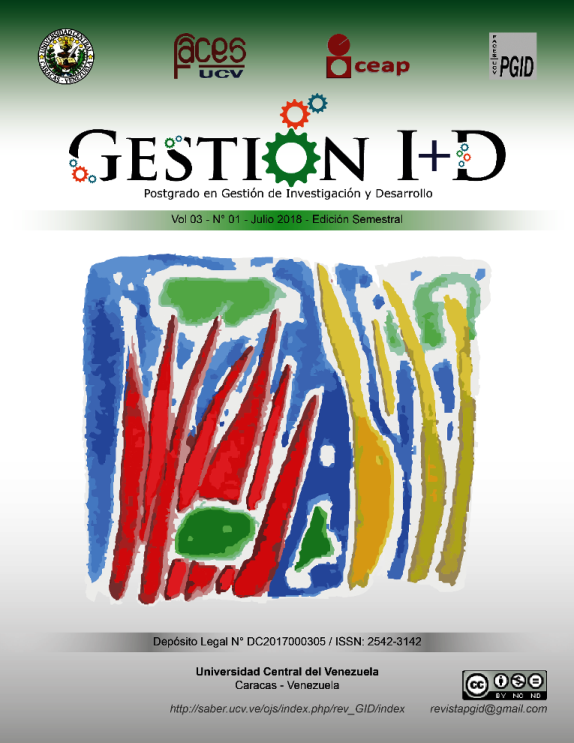Technological transfer as a means of leveraging development In venezuela: The case of PDVSA - drilling rings
Keywords:
Tecnología / Conocimiento / Apropiación del Conocimiento / Desarrollo Endógeno / Transmisión Tecnológica / Gestión del Conocimiento / Desarrollo Nacional / Taladros PetrolerosAbstract
In recent years, important cooperation mechanisms have been carried out with other countries, betting on this in the assurance of an adequate technology transfer that leads to a necessary social appropriation of knowledge. However, there are still conditions that are directly linked to guidelines and procedures that allow the country to guarantee this technological transfer through learning, appropriation, assimilation and knowledge dissemination processes. This article describes what happens in the management of experiences and knowledge in the area of operation and maintenance in drilling rigs that PDVSA uses in the Orinoco Oil Belt as a potential pilot area for the development of a knowledge management system that point to the appropriation of the same by the company and with this increase the efficiency and effectiveness in the processes of operation, repair, maintenance, handling of failures and contingencies that occur in the drills surpassing the dependence that currently has with the manufacturers of the same . Currently, the company does not have an explicit policy regarding technology transfer, so it is still dependent on technology suppliers, even for the maintenance of the technologies acquired and put into operation in the company. As a result of the research, an organizational proposal is made to be implemented within PDVSA to direct the process of knowledge management of the company and the transfer and appropriation of technologies.
Key words: Technology / Knowledge / Appropriation of the Knowledge / Development / Transmission Technology / Knowledge Management / National Development / PDVSA / Oil Drills.
Downloads
References
Castillo Arzola, N., & Molina Sanso, F. R. (2015). Programa de Gestión del Conocimiento para el Desarrollo Local. Retos de La Dirección, 9(1), 183–200. https://doi.org/10.13140/RG.2.1.5130.9928
Conti, G., & Briceño, F. (2015). Transferencia tecnológica. Aspectos a seguir para controlar el activo tecnológico en empresas del sector petrolero. Prospectiva, 13(2), 110–117. https://doi.org/http://dx.doi.org/10.15665/rp.v13i2.493
Galindo Melero, J., Sanz Angulo, P., & De Benito Martín, J. J. (2011). La Gestión y Transferencia del Conocimiento en el Ámbito de la Tercera Misión de la Universidad como Fuente de Innovación y Generación de Riqueza. Retrieved May 30, 2018, from http://www.jcyl.es/web/jcyl/binarios/553/375/La_gestion_y_transferencia_del_conocimiento.pdf
Huq, M. (2003). Building Technological Capability in Devloping Countries :the Case for Technology Policy. A Azhar.
Noriega, M. S. (2006). Transferencia tecnológica, ¿Qué podemos aprender de la experiencia internacional? Journal of Technology Management & Innovation, 1(3), 1–3. Retrieved from http://www.jotmi.org/index.php/GT/article/view/edi3
Ordoñez de Pablos, P. (2001). La Gestión del Conocimiento como Base para el Logro de una Ventaja Competitiva Sostenible: La Organización Occidental Versus Japonesa. Investigaciones Europeas de Dirección y Economía de La Empresa, 7, 91–108.
Pérez Molina, A. I. (2012). Hacia una nueva cultura empresarial: La transferencia de tecnología y de conocimiento. 3c Empresa, Investigación y Pensamiento Crítico, 7, 45–61. Retrieved from http://ojs.3ciencias.com/index.php/3c-empresa/article/view/129
Ranguelov Youlianov, S. (2002). La Gestión del Conocimiento. Un Enfoque para el Desarrollo Social. Biblios, 13, 1–8.
Rodriguez, M., García, F., Pérez, M. Á., & Castillo, J. V. (2009). La Gestión del Conocimiento, Factor Estratégico para el Desarrollo. Gestión En El Tercer Milenio, 12(23), 7–14. Retrieved from http://sisbib.unmsm.edu.pe/BibVirtual/Publicaciones/administracion/v12_n23/pdf/02v13n23.pdf


